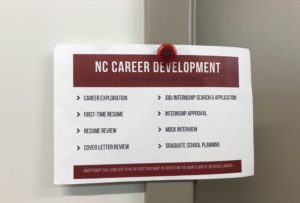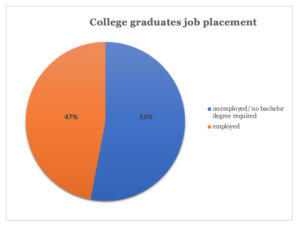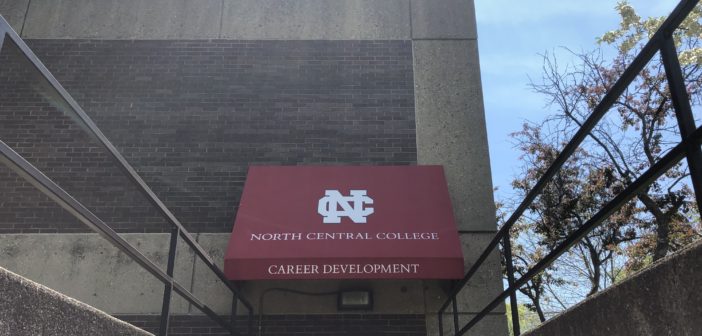According to the article, “One in six U.S. grads say career services was very helpful,” Zac Auter and Stephanie Marken say, “while 52% of U.S. college graduates report visiting the career services office at least once during their undergraduate experience, they are equally likely to say their experience was ‘not at all helpful’ (16%) as they are to say it was ‘very helpful’ (16%).”
With only about half of students reporting that they are visiting their career services office, it calls into question if students know about the services their campus.
At NCC, the Career Development Center has two locations in two separate buildings. One is a drop-in center located at Oesterle Library, and the other is by appointment at the School of Business and Entrepreneurship. NCC also provides access to Optimal Resume, which is an online source that students can utilize for interview preparation, resume and cover-letter building.

Photo by Gabriella Boyle
According to the National Association of Colleges and Employers, “In addition, students were more likely to pursue career counseling, career workshops, practice interviewing, and resume assistance at the career center office, while they were more likely to view job listings and research employers on the career center website.”
Education majors Arielle Gardner, ’19, and Marie Schlomas, ’19, were required to visit career services on campus for a class assignment and found that their experience wasn’t one they would recommend.
Audio PlayerFor students to find available job opportunities and internships, NCC utilizes the website Handshake. Handshake allows students to search for a variety of jobs and internships that are available not just in Illinois, but throughout the country in a variety of fields. Students can create their profile, upload their resume and apply for jobs directly through Handshake.
Julianne O’Brien, assistant director of career development, said opportunities are out there. “There are thousands of employers looking to recruit, there are phenomenal companies that have open positions locally in Illinois and across the U.S and even outside of the U.S as well.
“We do still have a number of positions, really great opportunities that we don’t get student applicants. I really can’t stress enough, take advantage, and for students to go and apply because these are employers that have come directly to us that have said we want to recruit North Central students.”
If employers are actively seeking recent graduates, why do students have such a hard time finding a job?

According to “What Can Students do to Improve Their Chances of Finding Employment After College” published by The University of Washington, “the fact is that approximately 53% of college graduates are unemployed or working in a job that doesn’t require a bachelor’s degree. It takes the average college graduate three to six months to secure employment after graduation. A student benefits from having a career-seeking strategy and previous work experiences. Otherwise, her resume might be lost in a stack of hundreds for a specific job.”
One would think that the more positions available to students, the higher success students would have when finding a new job.
In the article “Job prospects high for SC college grads entering the tight labor market,” Emily Williams writes that “about 99 percent of employers that responded to the National Association of Colleges and Employers’ Spring 2019 survey said they plan to participate in on-campus recruiting this upcoming fall, which is about 1.4 percent more than the year before.”
Business major Aiden Chang, ’19, has successfully found a job for after graduation within his desired field on his own.
Audio PlayerFor Chang, he knows that Handshake is one of the only sources available to students. According to O’Brien, there are many more opportunities available to students.
O’Brien said, “We can do a number of things, we do a lot of one-on-one appointments, anything from career exploration to building a resume, to cover-letter review, internship program planning and graduate school planning. We help students get connected to different positions, to internships and full-time positions, making connections with employers.”
According to the Strada-Gallup 2017 College Student Survey, “the findings also point to solutions, revealing that students who have these three career-focused experiences at their institution are significantly more confident about their preparation for the workforce: speak often with faculty or staff about their career options; have at least one university official initiate a conversation with them about their career options; and believe their school is committed to helping their students find a rewarding career.”
Professors taking on a role to help students find a job through classes can be a vital step throughout the students’ educational process. Students can utilize the benefits of having access to both professors and career development centers.
The relationship a professor can build with a student throughout their time at college can become strong. This relationship can then benefit students when it comes to the job search process. Computer science major Calli Bicknese, ’19, is finding it beneficial that her professors are helping her throughout this process.
In the article “Colleges really need to rethink the career advice they deliver,” Emily Deruy writes, “More college freshmen (86 percent since 2010, compared to 73 percent between 2000 and 2009) say getting a job is a key reason they decided to go to college, and there is increasing pressure from state and federal governments to hold schools accountable for graduating people ready to enter the workforce, particularly as tuition rises and graduates struggle with student debt.”
If more freshmen are saying that the main reason they are going to college is to get a job, then why aren’t more students utilizing the sources at hand to help them start the process earlier then their senior year?
Biochemistry major Julia McCartney said, “So, the science faculty here are incredibly supportive, and they definitely push research and push students getting involved early in research. I had never really thought about going to grad school or getting a Ph.D. before I came here. I got involved in research the summer after my freshman year, and I loved it. It was so different from class lab. I think the way faculty approached science here and that big push on get out there and try it even if you don’t think you necessarily want to do definitely helped push me in that direction.”
The standard path of a student in college is that they will graduate college and enter the workforce immediately after, but for some, that path isn’t necessarily the best option. For McCartney, she has the next five years of her life planned, and it involves more education.
While in college, students have access to a variety of sources readily available to them, but success in finding an internship or job through those sources isn’t a guarantee.

